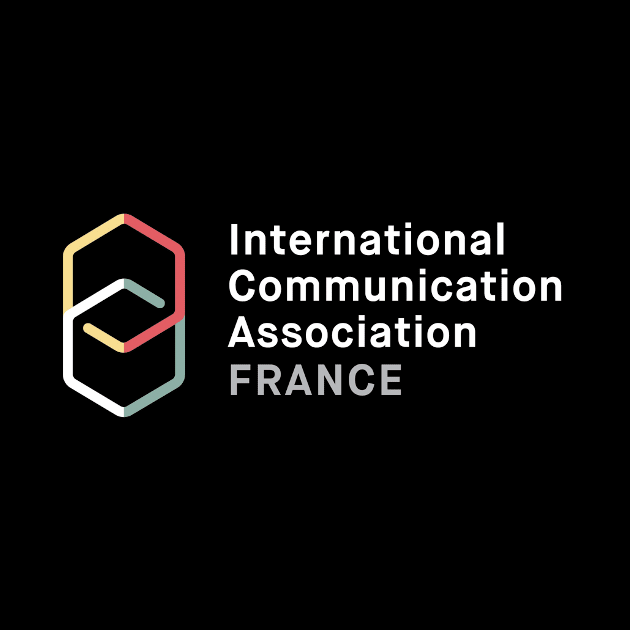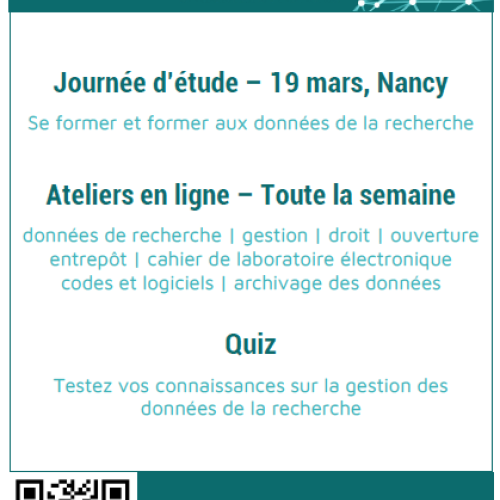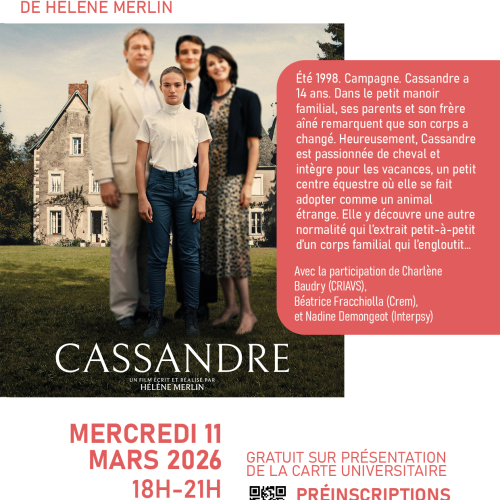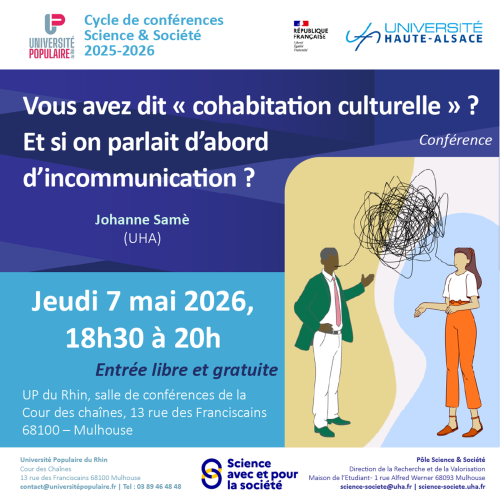[Webinaire] La recherche-création à l’épreuve des contextes / Les Rencontres de l’ICA France 2024-25 / ICA France Talks 2024-25

-
Crem, Centre de recherche sur les médiations
Communication, langue, art, culture
(UR 3476, Université de Lorraine, France) -
Cimeos, Communications, Médiations, Organisations, Savoirs
(UR 4177, UBFC, Université Bourgogne Franche-Comté, France) -
Cresat, Centre de recherche sur les économies, les sociétés, les arts et les techniques
(UR 3436, UHA, Université de Haute Alsace, France) -
ICA, International Communication Association
-
Laboratoire Elliadd Edition, Littératures, Langages, Informatique, Arts, Didactiques, Discours
(UR 4661, Université de Franche-Comté - l'Université Technologique de Belfort-Montbéliard, France) -
SFSIC, Société française des sciences de l'information et de la communication
Sur inscription préalable jusqu’au 12 mai ici / Register here until May 14th:
Le lien pour le webinaire sera envoyé aux inscrit⸱es deux jours avant le webinaire.
The webinar link will be sent to registrants two days prior to the webinar.
La session sera enregistrée, il est possible de vous inscrire afin de recevoir le lien vers l’enregistrement.
The session will be recorded, it is possible to register to receive the link to the recording.
Présentations en français avec sous-titres en anglais, commentaires en français et anglais.
Presentations in French with subtitles in English, comments in French & English.
Discutant⸱es / Discussants:
Angeliki Monnier, Crem, Université de Lorraine, membre de l’ICA France
Enzo d'Armenio, Crem, Université de Lorraine, membre de l’ICA France
Contact : angeliki.monnier[at]univ-lorraine.fr
[FR]
La recherche-création, en tant que démarche articulant investigation scientifique et création, connaît des développements variés selon les contextes nationaux et disciplinaires. En France, elle est présente dans les arts plastiques, le cinéma ou le design, mais elle ne bénéficie pas d’un cadre institutionnel stabilisé, comme dans des pays comme le Canada, par exemple.
Ce webinaire vise à interroger la pratique de la recherche-création ainsi que les manières de son implémentation, en explorant les cadres institutionnels, les méthodologies et les enjeux épistémologiques qui la façonnent.
Le séminaire s’inscrit dans le cadre des activités du chapitre français de l’International Communication Association (ICA France), qui vise à stimuler une approche réflexive sur la recherche menée en contexte international.
À propos des intervenant⸱es :
Yves Citton, professeur de littérature et médias à l'Université Paris 8 Vincennes-Saint Denis, est une figure importante de la pensée contemporaine sur l’imaginaire, la culture et les dynamiques de savoir. Ses travaux, situés à l’intersection des humanités, de la théorie critique et des études médiatiques, interrogent notamment les formes d’attention, la circulation des idées et les mutations des modes de 3 production intellectuelle à l’ère numérique. Sa perspective transdisciplinaire et son engagement dans des approches innovantes du savoir le conduisent à interroger les dynamiques de création et de transmission des connaissances, en mettant en dialogue les arts, les sciences humaines et les médias contemporains. Son ouvrage Pour une écologie de l’attention (2014) propose une réflexion sur les conditions de réception et de production des savoirs dans nos sociétés saturées d’informations. Dans Ce que la recherche création fait aux thèses universitaires, il soutient que l’union de la rigueur scientifique et de la créativité artistique peut générer des connaissances inédites, remettant en question les paradigmes conventionnels et ouvrant la voie à l’exploration de phénomènes complexes.
Erika Fülöp, professeure à l'Université de Toulouse 2 – Jean Jaurès, est une spécialiste des littératures numériques et des formes d’écriture expérimentales à l’ère du digital. Ses recherches portent sur les transformations des pratiques littéraires et artistiques à travers les technologies numériques, explorant notamment la création interactive, les écritures en ligne et les mutations des processus d’énonciation et de réception. Son engagement dans la recherche-création se manifeste notamment par des projets expérimentaux qui articulent réflexion théorique et production artistique, cherchant à repousser les frontières entre analyse académique et pratique créative. Plus particulièrement, en travaillant sur les littératures numériques à travers des approches comparatives et interdisciplinaires, elle met en lumière les spécificités des dispositifs numériques comme vecteurs d’innovation artistique et de renouvellement des méthodologies en sciences humaines. Ses travaux contribuent à une réflexion plus large sur la manière dont les pratiques créatives et intellectuelles s’hybrident, et sur les enjeux épistémologiques et institutionnels de la recherche-création dans un contexte international. Ayant réalisé une thèse sur Proust en Ecosse et un postdoc sur le roman français contemporain en Allemagne, le premier poste d’Erika Fülöp était en French Studies en Angleterre, à l’université de Lancaster. Elle y a travaillé de plus en plus sur la littérature nativement numérique, jusqu’à sa nomination en 2022 à un poste en Lettres modernes à l’Université de Toulouse 2, avec une orientation humanités numériques et création littéraire.
[ENG]
Research-creation, as an approach articulating scientific investigation and creation, has undergone various developments according to national and disciplinary contexts. In France, research-creation is present in visual arts, cinema or design, but does not benefit from a stabilized institutional framework, unlike countries such as Canada, for example.
This webinar aims to question the practice of research-creation as well as the ways of its implementation, by exploring the institutional frameworks, methodologies and epistemological issues that shape the latter.
The online seminar is part of the activities of the French chapter of the International Communication Association (ICA France), which aims to stimulate discussions regarding research conducted in an international context. It comprises two presentations:
“Research-creation between epistemological makeshift, ecological disaster and institutional transformation” by Yves Citton
This presentation will attempt to tie together three apparently very different aspects of artistic research activities, as they take place in university contexts: on the one hand, research projects that mobilize artistic practices to bring out, document and share very small things which H.-J. Rheinberger called “epistemic things”; on the other hand, very large-scale socio-anthropological bifurcations necessary to adapt our lifestyles, teaching, research, consumption and production to preserve what remains of co-habitability 4 within our planet; finally, an evaluation criterion proposed by E. Kirkkopelto making their re-instituting potential the criterion for the success of research-creation activities
“Research-creation: practices and policies in France and the United Kingdom (crossing the Channel, crossing disciplines)” by Erika Fülöp
The crossing of the century and the media, from paper to digital, has led to an evolution of theoretical and methodological aims with practical consequences. If in literary studies it is common to analyze a novel typically without trying to write one, when faced with digital creations we are quickly limited if we do not know the functioning of the devices invested by the creators. According to Erika Fülöp, this knowledge inevitably comes through practical experimentation – hence her initial investment in creative projects. However, the place of such projects remains poorly defined at the university, at least in certain disciplines. The situation is very different in the United Kingdom compared to France, for a number of reasons related to the structure of higher education and research, their history, and the positioning of the different disciplines. Based on her personal experience and other case studies, Erika Fülöp identifies key elements to compare the situation of research-creation in France, from her point of view in modern literature, and what is rather called “practice-based research” in the United Kingdom, from the perspective of “modern languages” as a discipline.
About the speakers:
Yves Citton, professor of literature and media at the University of Paris 8 Vincennes-Saint Denis, is a key figure in contemporary thinking on the imagination, culture and the dynamics of knowledge. His work, situated at the intersection of the humanities, critical theory and media studies, questions forms of attention, the circulation of ideas and the mutations of modes of intellectual production in the digital age. His transdisciplinary perspective and his commitment to innovative approaches to knowledge lead him to question the dynamics of creation and transmission of knowledge, by bringing together the arts, the humanities and the contemporary media. His book Pour une écologie de l'attention (2014) propose a reflection on the conditions of reception and production of knowledge in our information-saturated societies. In What Research-Creation Does to University Theses, he argues that the union of scientific rigor and artistic creativity can generate new knowledge, challenging conventional paradigms and paving the way for the exploration of complex phenomena.
Erika Fülöp, professor at the University of Toulouse 2 – Jean Jaurès, is a specialist in digital literatures and experimental forms of writing in the digital age. Her research focuses on the transformations of literary and artistic practices through digital technologies, exploring interactive creation, online writing, and mutations in the processes of enunciation and reception. Her commitment to research-creation is manifested in particular by experimental projects that articulate theoretical reflection and artistic production, seeking to push the boundaries between academic analysis and creative practice. More specifically, by working on digital literatures through comparative and interdisciplinary approaches, she highlights the specificities of digital devices as vectors of artistic innovation and renewal of methodologies in the humanities. Her work contributes to a broader reflection on the way in which creative and intellectual practices hybridize, and on the epistemological and institutional issues of research-creation in international contexts. Having completed a PhD thesis on Proust in Scotland and a postdoc on the contemporary French novel in Germany, Erika Fülöp’s first position was in French Studies in England, at Lancaster University. She worked more and more on natively digital literature, until her appointment in 2022 to a position in Modern Literature at the University of Toulouse 2, with a focus on digital humanities and literary creation.
46.603354, 1.8883335




